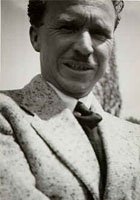Flexmore Hudson
Flexmore Hudson Poems
Midsummer noon: and the timbered walls
start in the heat;
and the children sag listlessly over the desks,
with bloodless faces oozing sweat
...
When clear October suns unfold
mallee tips of red and gold
children on their way to school
...
Flexmore Hudson Biography
Wilfred Frank Flexmore Hudson, poet, short-story writer and schoolteacher, was born on 22 September 1913 at Charters Towers, Queensland, eldest of four sons of Wilfred Flexmore Hudson, a Tasmanian-born Baptist minister, and his wife Irene Maud, née Rathbone, from Rockhampton. The family moved often before settling in Adelaide in 1924; Flexmore attended thirteen primary schools in Australia and New Zealand. Completing his secondary education at Adelaide High School, he was a keen rower, sculler, swimmer and boxer. A student at Adelaide Teachers’ College, he also enrolled in the arts faculty at the University of Adelaide, but did not finish his degree. He taught at small country schools including Narrowie (1936), Caliph (1937), Hammond (1939-41) and Lucindale (1942-45). On 17 January 1938 at the office of the principal registrar, Adelaide, Hudson married Myrle Desmond (d.1979). In 1941 he launched Poetry, an influential periodical that he edited for six years and which was initially very successful. Although a friend of Rex Ingamells, he was a lukewarm Jindyworobak supporter, not sharing the enthusiasm for Aboriginal culture that partly characterised the movement. Invited to edit the 1943 Jindyworobak Anthology, he chose an initial selection of poems deemed by Ingamells to be insufficiently `Jindyworobak’. Hudson made a few changes and the anthology was published, more or less with Ingamells’s blessing. In 1946 Hudson resigned from the Education Department and freelanced. He wrote for the Australian Broadcasting Commission and produced a children’s history that was serialised in an educational `comic’ and later published as a book, The Story of the Polynesians (1948). Living on the proceeds of a Commonwealth Literary Fund fellowship awarded in 1946, he began a novel but abandoned it. Forced to discontinue Poetry in 1947 and left with a crippling debt of £400, he escaped to sea in a schooner for about a year. In 1950-63 he was senior English master at Scotch College. Also the school’s rowing coach, he was proud of the success achieved by his teams. He later taught at King’s College, Henley High and, finally, at Adelaide Boys High schools, retiring in 1978. As a writer, Hudson had a minor but distinct talent. He published six books of poetry between 1937 and 1959, displaying in them a lyrical skill in depicting the Australian landscape and a tendency to polemicise. Probably the collections As Iron Hills: Poems (1944) and Pools of the Cinnabar Range (1959) contain the best examples of his poetry. `Song of Australia’ and `Drought’ have been frequently anthologised while his reflective, philosophical `To a Cuttlefish’ was thought by the poet himself to be probably his best work. In 1985 a collection of his short stories, Tales from Corytella (compiled and edited by Adam Dutkiewicz), was published. A humanist, Hudson leaned towards Buddhism. He had been active in the peace movement and the Fellowship of Australian Writers in the 1950s. Despite a succession of life-threatening illnesses, he was fit and physically compact, with handsome features and brown hair. He usually sported a small moustache. In later years he developed diabetes and Alzheimer’s disease, and suffered a stroke. Survived by his son, he died on 14 May 1988 at Kings Park, Adelaide, and was cremated.)
The Best Poem Of Flexmore Hudson
Drought
Midsummer noon: and the timbered walls
start in the heat;
and the children sag listlessly over the desks,
with bloodless faces oozing sweat
sipped by the stinging flies.
Outside, the tall sun fades the shabby mallee
and drives the ants deep underground;
the stony driftsand shrivels
the drab, sparse plants;
there's not a cloud in all the sky to cast
a shadow on the tremulous plain.
Stirless the windmills; thirsty cattle, standing despondently about the empty tanks;
stamping and tossing their heads,
in torment of the flies from dawn to dark.
For ten parched days it has been like this
and, although I love the desert I
have found myself
dreaming
of upright gums by a mountain creek
where the red borinia blooms,
where bellbirds chime through the morning mists,
and greeness can hide from the sun;
of rock-holes where the brumbies slink
like swift cloud-shadows from the gidgee scrub
to drink when the moon is low.
And as I stoop to drink, I too,
just as I raise my cupped hands to my lips,
I am recalled the drought-stricken plain
but the petulant question
of a summer - wearied child.
